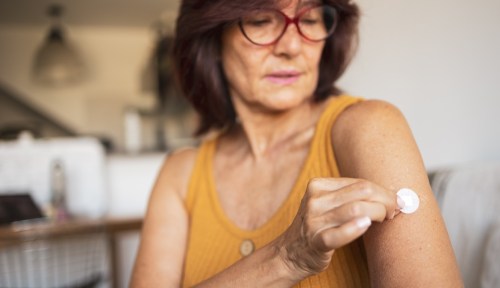As you may already know, menopause comes with a lot of not-so-fun symptoms, to put it mildly. Primarily, people talk about hot flashes and mood swings. But new research shows that perimenopausal and menopausal people also experience brain fog, anxiety, and depression at staggering rates—despite the relative lack of discussion surrounding them. And it’s this information gap that makes going through “the change” even more bewildering, explains Alicia Jackson, PhD, health-tech entrepreneur and founder of Evernow, a direct-to-consumer menopause treatment business.
Experts in This Article
health tech entrepreneur and founder and CEO of menopause treatment business Evernow
Catherine Hansen, MD, MPH, is an OB/GYN and medical consultant for Evernow, a direct-to-consumer menopause treatment business.
OB/GYN and Women’s Health Advisor, Evernow
Makeba Williams, MD, is an OB/GYN and women’s health advisor for Evernow, a direct-to-consumer menopause treatment business.
medical director of the Menopause Society and director of the Mayo Clinic Center for Women’s Health
“So many women who come to us are like, ‘My doctors aren’t doing anything for me.’ And sometimes: ‘I didn’t even realize I was going through menopause because these weren’t the symptoms I was looking for,'” says Dr. Jackson. “So many women are told, ‘Oh, maybe you should eat better, exercise, or try to have less stress in your life.’ And it’s like, no, they’re actually going through perimenopause and you can do something about it.”
“Menopause has been very misunderstood.” —Alicia Jackson, PhD, founder of Evernow
In a study involving over 40,000 perimenopausal and menopausal women, Evernow found that nearly 80 percent of respondents experienced brain fog, and anxiety and depression were reported by 60 percent. (The research did not illuminate findings among non-binary or transgender individuals with uteruses.)
“Overall, the story that we are seeing is that mood issues peak in perimenopause and then slowly decline,” says Catherine Hansen, MD, MPH, Evernow medical consultant and OB/GYN. “Interestingly, brain fog is a real issue that doesn’t seem to get better. As for why we see these effects on mental health and mood, hormones like estrogen are known to bind to receptors on the brain cells themselves providing stabilization and modulating other chemical messengers like the neurotransmitters acetylcholine, serotonin, dopamine, and GABA.”
More than mood swings
It’s the decrease in estrogen that causes the cognitive and mental health symptoms of menopause, explains Dr. Hansen. “Specifically, two brain areas—the pre-frontal cortex and the hippocampus, known for high-level cognitive function, learning, and memory—are rich in estrogen receptors and seem to be affected by a decline in estrogen,” she says.
When these changes happen, they can have an impact on mental health and well-being, explains Makeba Williams, MD, Evernow women’s health advisor and OB/GYN. “Notable declines in the ability to remember, learn, or make quick decisions around the time of perimenopause and menopause can cause immense frustration leading to anxiety, increased stress, and sleep disturbances,” says Dr. Williams. “It’s also worth mentioning that the menopausal transition often occurs at periods of peak stress, as women are often sandwiched with the responsibilities of children (teens/adults) and aging parents, and perhaps increased occupational stress and change. These familial and work-related challenges along with other stressors can exacerbate these symptoms.”
Something that can compound the issue? Dr. Jackson says that perimenopausal and menopausal people don’t often learn about these symptoms from their doctors because many doctors aren’t even aware. Similar to other reproductive health issues, like uterine fibroids, menopause is under-funded and under-researched.
“Most doctors have only ever gotten an hour or two of training about menopause,” she says. “And when they’re told about it in the traditional sense, they’re told it’s hot flashes and night sweats.” And it’s not much better among OB/GYNs—only one in five gynecologists are trained in menopause. “They get a little bit more [than other doctors], but they’re way behind. Because traditionally, OBs are all about delivering babies, and gynecology was all about gynecological surgery. So, hysterectomies were how you often dealt with female issues. Menopause has been very misunderstood.”
Some key findings from Evernow’s research
Amongst the major revelations of the Evernow study was the finding that weight did not impact menopause symptoms as conventionally accepted. “Traditionally it’s thought that heavier women have milder menopause symptoms because fat produces a form of estrogen,” says Dr. Jackson. “However, we found exactly the opposite, which is, heavier women tend to have worse menopause symptoms.” Additionally, they discovered that women who have had hysterectomies experience worse menopausal symptoms than those who entered menopause more gradually.
“We found across the board that women who had hysterectomies had significantly worse symptoms than women who did not,” says Dr. Jackson. “Women need to be prepared for this; they need to be educated about it. They need to be told: ‘Okay, this might be the best thing, but if this happens to you, you probably also want to consider hormonal therapy to supplement the fact that you’re going from 100 to zero overnight.'”
While diet, exercise, talk therapy, mindfulness, and antidepressants can aid the cognitive and mental health symptoms of menopause, Cynthia Krause, MD, Evernow women’s health advisor and OB/GYN, says hormone therapy can be extremely beneficial, too. “It can bring a woman’s estrogen levels back up,” she says.
Currently, Evernow is collecting follow-up data from over 250 of its members about how their symptoms improved after they began taking hormone therapy. So far, over 63 percent saw an improvement in brain fog, 78 percent found an improvement in anxiety and depression, and 76 percent saw improvement in mood swings.
The hormones used to treat menopausal symptoms are often at much lower doses than what’s in hormonal birth control, which is often the only hormonal treatment option perimenopausal people receive from their doctors.
“Low-dose birth control that combines estrogen and progestin can also work well for perimenopausal symptoms,” says Dr. Krause. “One disadvantage is that many women in the perimenopausal age group have contraindications to hormonal birth control due to underlying medical conditions or smoking. It is a higher dose than we give for menopause, as its purpose is to provide contraception.” Also, unlike birth control, the estrogen patch that we most commonly use does not increase the risk of blood clots.”
Starting hormonal therapy for menopause
When you’re looking to get on hormone therapy for menopause, your first step is a conversation with your doctor. “The doctor is really there as someone you are hiring to help you take care of you body, and they’re there to help give you the options that are going to be safest and most effective for you,” says Dr. Jackson. If you’re noticing any hesitancy, Dr. Krause advises that you make your case and know that you have the right to do so. But, if your doctor is unwilling or unable to provide the menopause care you’re interested in, you may consider seeking out a doctor who is trained in menopause or trying a service like Evernow that you can use in tandem with your doctor.
“If your doctor is not up to date on the things that they’re trying to manage, that’s never a good thing for your overall health,” Stephanie Faubion, MD, North American Menopause Society (NAMS) medical director and director of the Mayo Clinic Center for Women’s Health, previously told Well+Good. If you feel like you’re not getting the answers that you need, Dr. Faubion says you should be getting care from another person.
Even without hormone therapy, some of the symptoms of menopause will improve on their own, meaning it’s possible to be weaned off of these hormones without experiencing a relapse in symptoms. “The symptoms of menopause usually decrease over time, but studies have shown that they last on average for seven years, longer than we previously thought,” says Dr. Krause. “Further, about 10 percent of women continue to experience menopausal symptoms indefinitely.” While incidences of brain fog remain high between perimenopause and late menopause (five to 10 years after the last period), anxiety and depression decreased from 67 percent to 55 percent and mood swings decreased from 71 percent to 48 percent, shows Evernow’s research.
And while this study from Evernow is a great step in the right direction, far more research needs to be done on menopause and its treatment options. “The media is finally beginning to focus more on this demographic, and the hope is that this will raise awareness in the scientific community as well,” says Dr. Krause. “One of the reasons we felt it was so important to publish the study was to provide more information about this experience in hopes of generating more interest among all parties. Momentum begets momentum.”
Oh hi! You look like someone who loves free workouts, discounts for cult-fave wellness brands, and exclusive Well+Good content. Sign up for Well+, our online community of wellness insiders, and unlock your rewards instantly.
Sign Up for Our Daily Newsletter
Get all the latest in wellness, trends, food, fitness, beauty, and more delivered right to your inbox.
Got it, you've been added to our email list.











